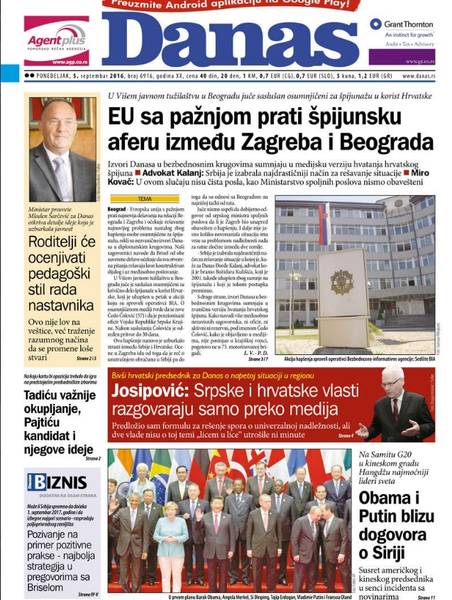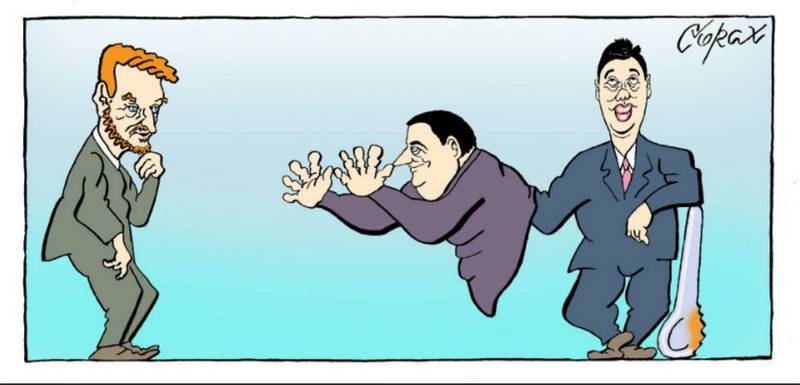NOVANEWS
A new episode, which could further worsen Serbian – Croatian relations, which have already hit an all-time low since the 1990’s, is the leading subject of Croatian and Serbian media today. Commissioner for Enlargement Negotiations Johannes Hahn joined in the reactions. Today’s press review of media from ex-Yugoslavia continues with the subject of the referendum in Republika Srpska of Bosnia and Herzegovina, elections in Croatia, an interview with the Russian ambassador to Zagreb, and the visit of Hungarian Prime Minister Orbán to Belgrade.
Could it be worse?

A new drama exploded between Belgrade and Zagreb on Friday afternoon – the “Balkan spy” affair, as the media on both sides of the border are calling it, based on the title of the Yugoslav film from the 1980’s of the same name. On Friday afternoon the 57-years old Čedo Čolović, who has double citizenship was arrested in Belgrade. Some Croatian media claim that he served in the army of the self-proclaimed Republic of Serbian Krajina in the beginning of the 90’s, but his relatives claim he served in the Yugoslav People’s Army. Following the war with Croatia he moved to live in Serbia. The Serbian prosecution accuses him of espionage on behalf of Croatia. On Sunday, the prosecution asked for a detention order due to risk of escape, Croatian media report.
Over the weekend the affair caused reactions of surprise among Croatian authorities, which qualified the affair as more theatrics, badly directed this time. Everyone in Zagreb agrees that this is not the way to report the apprehension of a spy. President Kolinda Grabar-Kitarović discarded the claims that the arrested person is a Croatian spy, and Croatian media published over the weekend interviews with Čolović’s relatives and friends, according to whom it was utterly impossible that he was a spy and the whole story was made up. Serbian national television quoted Serbian Minister of Internal Affairs Nebojša Stefanović, according to whom upholding the law could in no way endanger relations between Serbia and Croatia. “Should any state attempt to be actively involved in the destruction of our state order, it would only prove that this state has no good intentions towards Serbia”, stated Stefanović.
Serbian Blic publishes the opinion of the renown analyst with the London School of Economics (LSE) James Ker-Lindsay, according to whom Croatia is to blame for the current state of relations between Belgrade and Zagreb. The publication does not make it clear where Mr Ker-Lindsay spoke – whether Blic itself asked him to comment, or did he speak elsewhere. The analyst is quoted in saying that he is disappointed and worried by the relations between Serbia and Croatia. “I believe that the burden of guilt falls to Zagreb. Ever since Croatia joined the EU, there is considerable rise of nationalism in the country”, he claims.
Danas quotes diplomatic sources and reports that the EU is following the espionage affair closely, but it is unrealistic to expect a public reaction from Brussels. Bosnian Klix quotes an interview with Commissioner for Enlargement Negotiations Johannes Hahn (Austria, EPP), who urges that authorities from the region put an end to verbal attacks. “I fully understand that these are in a time of campaigning, but at the same time during a campaign everyone should be aware that a day will come after the elections when you will have to cooperate.” He did, however, remind candidate states that they, too, have the responsibility to contribute to stability in the region.
Croatia has a Spanish scenario coming
The starting week is the last one before the snap parliamentary elections in Croatia (on September 11), so quite naturally the subject prevails in Croatian media. Jutarnji list publishes an opinion poll, showing that results from the elections will be almost the same as last year, which once more means long negotiations on forming a government and a possibility of a third vote, like in Spain. According to the poll, the People’s coalition would secure a total of 62 seats in Parliament, and the HDZ – 55. An interesting moment in the survey, noted by Jutarnji, is that the HDZ gets just one seat less than last year, despite appearing alone (with no pre-election coalition partners). This means that extremist parties had no great influence on the political right-wing anyway, journalist Ivanka Toma comments.
The left-wing daily newspaper from the city of Rijeka Novi list has a different accent. In his commentary Dražen Ciglenečki writes that this year’s elections will be a test not only for politicians, but the extent of Croatian media’s influence over voters as well. The author claims that since the year 2000 never has a single candidate or a political party received such great media support before elections like the new HDZ leader Andrej Plenković and his party enjoy today. According to Ciglenečki, this is a true phenomenon. Media are virtually competing in showing Mr Plenković in the best possible light, while at the same time besmearing former PM Zoran Milanović.
“Should a foreigner analyse attitudes in Croatian media towards Plenković and Milanović over the last month, they could conclude that the former is the establishment candidate and the latter is some kind of an outsider, who is dangerous to the system and whose victory must be prevented”, writes the columnist. “It is because of just such media behaviour that parliamentary elections are not only a test for the political parties. They are a huge challenge to media influence over voters. Political preferences are as a rule hard set and the majority of citizens don’t switch them from one election to the next”, concludes Dražen Ciglenečki.
The online edition tportal focuses on something euinside too forecasted recently – the fact that following September 11 it is quite possible that there will be new internal party elections in the Social Democratic Party SDP. The edition questions whether Milanović will be followed again as leader to the party by … Milanović, who got re-elected this spring after a fierce battle with Zlatko Komadina. tportal does a review of possible successors of the former PM, amongst whom there is again mention of the name of the former foreign affairs minister and current MEP Tonino Picula.
Media in Croatia today are hard into discussing the video of the coalition surrounding the Eurosceptic, SYRIZA-like party “Live wall”. The video turned into a real hit and the colleagues in Zagreb are uniformly praising it, without necessarily having any sympathies for the party’s ideology.
Russia wishes to join USA’s anti-missile defence system
Croatian Vecernji list publishes today its second interview this summer with the Russian ambassador to the country, Anvar Azimov, who assures that Russia is not a threat, but a partner to the EU. “Russia has never been a threat to the European continent. Quite the opposite – Russia saved Europe in the First and Second World Wars”, states the ambassador and repeats the already well known Moscow theories that it is not Russia that is in a process of expansion, but NATO. “If the anti-missile defence system truly aims at protecting Europe from terrorism, we are prepared to be a part of this system. Besides, we are willing to remove all of our missiles if the missile defence system is not targeted at the Russian Federation”, continues Mr Azimov.
He also claims that Russia supports the territorial integrity of Ukraine and believes the Donbas should be part of the Ukraine, but with a special status. Moscow supports Erdoğan, but does not interfere with his domestic affairs, but “Erdoğan, just like Assad in Syria too, was elected president”, is another important thesis in the interview with the Russian ambassador. On the subject of the Balkans, Anvar Azimov states that the region is important to Russia, just as it is to the USA and the EU. He recommends that Croatia does not look at Russia through the prism of its relations with Serbia. In conclusion he announced that those, who imposed sanctions on Russia, will not get away with it after the sanctions are lifted. “Surely, sanctions will end in a year or two and Russia will then begin placing purchase orders for goods, but everyone’s behaviour during the sanctions will be reviewed. In this sense Croatia will not fare well” is the message of the Russian diplomat to Zagreb.
“Think again about the referendum”

Such is the message of Commissioner Johannes Hahn in his interview for Radio Free Europe, quoted by Bosnian media. He stated that he does not wish to interfere on this subject, but expects court rulings, especially ones of the Constitutional court, to be enforced, reports Klix. At the same time from Belgrade, Serbian Internal Affairs Minister Nebojša Stefanović points a finger at the EU High Representative of Bosnia and Herzegovina Valentin Inzko, who in an interview for the Serbian Politikastated that going forward with the referendum might have serious consequences for BiH and the region. This could lead to the destabilisation of BiH, thinks Inzko. “The job of Valentin Inzko is ensuring stability in BiH, rather than having his appearances and activities contribute to instability and raising tension”, replied deputy Prime Minister Stefanović.
Orbán in Belgrade
Leading subject to Serbian media today is the visit of Hungarian Prime Minister Viktor Orbán. On this occasion Blic prints a thorough portrait of Mr Orbán, naming him a “controversial politician”, who has known ever since 2010 that Vučić will come to power. Back then, still in his capacity of an opposition leader, he met in Belgrade first with the leadership of the Serbian Progressive Party, instead of first meeting the ruling party in Belgrade, reminds Blic. It presents the Hungarian PM as the man, who turned into the central attention point in the EU because of his attitude towards migrants and his decision to build walls along Hungary’s borders with Croatia and Serbia. Orbán is the first European leader to support Trump, calling him “the better alternative” for the EU than his opponent Hillary Clinton, reports Blic and reminds that Orbán is often nicknamed “little Putin” because of the laws, with which he practically instituted media censorship, because of his monetary policy, and his criticism of the EU.


